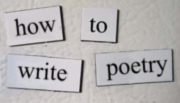How to Write Poetry
 Here is a short guide to help you on your way to becoming a Poet. First, you have to know what words to use. If you were a carpenter, would you build a house using driftwood? Of course not! So don’t go building your poetry using driftwords. Throughout this instructional essay, I will drop words like pieces of bread (hereafter denoted by an asterisk) leading you out of the forest of bad poetry. Here is one made of solid oak: “tendrils.” Just look at it. Maybe you’re thinking, “Is that some type of pasta?” No, it’s a word! And not just any word, it’s a poetry-word! Here’s an example:
Here is a short guide to help you on your way to becoming a Poet. First, you have to know what words to use. If you were a carpenter, would you build a house using driftwood? Of course not! So don’t go building your poetry using driftwords. Throughout this instructional essay, I will drop words like pieces of bread (hereafter denoted by an asterisk) leading you out of the forest of bad poetry. Here is one made of solid oak: “tendrils.” Just look at it. Maybe you’re thinking, “Is that some type of pasta?” No, it’s a word! And not just any word, it’s a poetry-word! Here’s an example:
Her hair fell like tendrils* into the gaping maw* of night.*
Not bad, eh? And look, we’ve got two more. “Maw” is just a fancy way of saying “mouth,” but if you’re going to write a poem about visiting the dentist, make sure you say something like “That son-of-a-bitch (it’s O.K. to cuss in poetry) yanked the tooth right out of my gaping* maw.” Notice the use of “gaping” here. The two are often seen together. And let’s not forget “night.” This simple word is the poet’s lonely friend, the friend who walks down a deserted road kicking pebbles across the fecund* path of life, the friend who holds the poet’s hand in the dark. Let us not forget him. Or her.
Now I’d like to talk about something that is a bit of a secret in most poetry circles: Indentation!
Let’s say you have a fairly boring couplet like this:
She left a coffee
stain on my tabled heart
Yawn, right? Now watch this:
She left a coffee
stain on my tabled heart
Can you say New Yorker? You’ve just gone from coffeehouse amateur to professional just by hitting your tab button a few times. If you look in your better-known poetry magazines, you’ll often find examples of everyday poems dressed up in these poetic suits. If clothes make the man, then indentation makes the poem. Don’t take my word for it, try it yourself! And hey, if you like suits, then you can try formal poetry. Don’t worry if the free verse folks make fun of you. Formal poetry is the new black this season. They’ll still be wearing hand-me-downs while you’re sporting a fancy new sonnet. Here’s an example:
Dirt Weed Sonnet
(Actually, who really wants to read a sonnet? Let’s just skip it.)
Another great way to be a certified poet is to write about poetry. Nothing says you’re a poet better than penning an ode to your favorite pastime. Whatever you do, make sure you place the word “Poem” in your title. Here’s an example:
Poem about a Pony named Poetry
You’ll notice I killed two birds with one stone there. Who wouldn’t publish that?! If this fails for some reason, try writing about yourself. Who is the most interesting person you know? You, of course! If you do decide to go this route, try using the following formula (it’s not fail-proof, but it should get you rolling):
I did this
Then I did that
And when I sat back from it all
I had this insightful and somewhat ambiguous thought
Please beware of something called “adjectivitis.” I see this often . A poem can become sick and diseased if you don’t use enough adjectives. I like adjectives. I also like sugar. I have a whole box of sugar cubes next to my coffeemaker. Do you think I use just one sugar cube in my coffee when I have upwards of 80 at my disposal? Hell no! Sometimes I’ll use two, three, and if I’m really hung-over, then I’ll use four. Do you see my point? We all have at least 80 adjectives sitting in our collective sugar-cube boxes. See what happens to this ordinary cup of a poem:
She was a lovely person
One lump or three?
She was an ugly, sad, horny, lovely person
Next up is the use of simile and metaphor. These are what car-bombs are to terrorists. Without them, you’re nothing more than an angry person with too much religion stewing in their bottom who can’t afford a rocket launcher. See how I did that? I compared the terrorist with the poet. You are the terrorist! Plant your homemade word-bombs along the roadside of your audience’s mind and let them rip! Ka-blooey!! If you do your job right, you’ll have innocent corpses strewn about everywhere.
Simile example:
She said my poetry was like a kittenMetaphor example:
peeing in a basket
of freshly washed laundry
The laundry basket was an amazing poem
a certain someone couldn’t appreciate
because she was stupid in the face
That’s pretty much it, though there are a couple more things you should know before sitting down and creating your first masterpiece. Maybe you’ve heard of something called a “muse.” Don’t worry about this. Muses used to exist back in Shakespeare’s day, but they haven’t been seen since. What I suggest is a good night’s sleep, some bacon and hash browns, a good cup of coffee, some quality time in the bathroom (if you catch my drift),and bingo—you’ve got yourself a muse.
Some ideas if you’re stuck:
Has anybody died in your family lately? Maybe a close friend? Why not turn it into poetry! You probably went to the funeral and it wasn’t very much fun. Well what are you waiting for? Write a poem about it! Or maybe you have a journal lying around full of sad thoughts about that guy who cheated on you with your hot deaf sister. Surely, you say, that can’t be poetry fodder. The answer is: Hell yes! Copy it down word for word, indent here and there, maybe indent again just for dramatic emphasis at the part where he tells you right in front of your hot deaf sister but she pretends not to be able to hear (but you know she really can). And what do we have here? A poem titled: My Hot Deaf Sister Is a Poem I Hate.
Once you’ve actually written your poem, you should look for the heart of your poem. The heart is the central focal point of the piece, the place that pumps blood to the other parts of the poem. Many beginners often mistake the leg for the heart. It’s easy to do. A good way to avoid this is by placing your ear against the poem and listening for the “ba-dum, ba-dum”of creativity. When you find it, stick a pin in it so you can find it again later.
You’re going to hear a lot of writers talking about something called “Revision.” I wouldn’t recommend it. It’s basically like going in for a haircut, having them cut maybe two or three hairs, then you go outside for a cigarette, then walk back in and ask them to cut two or three more hairs. Rinse and repeat ad nauseam. Why bother? Just write one big hairy poem and let it be. Think of it as that Japanese art (who knows what it’s called!) where broken stuff is more beautiful because it’s flawed. Just think how many beauty marks your poem will have if you don’t revise it!
And finally, online poetry workshops. These are places you can show your poetry to other poets who will then tear your poem apart, disembowel it like a rabid pack of beret-wearing dogs, vomit it back up into a new and improved version of your original poem. This is invaluable. I highly recommend it.
A few words on giving readings:
If your poetry isn’t so good, I suggest you adopt a unique speaking voice that will captivate your audience. For example, I once gave an entire reading in Captain Kirk’s voice and nobody was the wiser. If all else fails, shout! It worked for the beatniks, why not you?
Also, don’t merely speak the words. Instead, look at the members of the audience like they are shards of glass that as a whole make up a mirror reflecting your beautiful poetic self. That way, you’re reading to your biggest fan: You!
Before I go, here is a list of words (and an example poem) that you should become familiar with if you decide to go down this glorious road we call Poetry Lake.
*tiny—use this whenever you want to use the word “small.” How much more poetic is “her tiny earlobe” when compared to “her small earlobe”? You’re not going to get laid writing like that!
*rictus—the editor’s mouth broke into a blinding rictus (like “gaping maw,” this usually accompanies “rictus”) when he saw this prize-winning word.
*Latin (anything)—know what the Latin word for “peach” is? Me neither. Make one up. Who’s going to know the difference? How many Latin teachers have you ever met? Exactly.
*pomegranate—see usage below.
Example Poem
Listen to the tiny
night time
As the pomegranate balls
descend in lust
into the gaping maw
that is our strange, brutal, nice love.
Fear not the iridescent
rictus of word;
It will lead you by the
dendroaspis hand
of eternity.
—from the author of Belly Gazing: A Lifetime in Poetry





